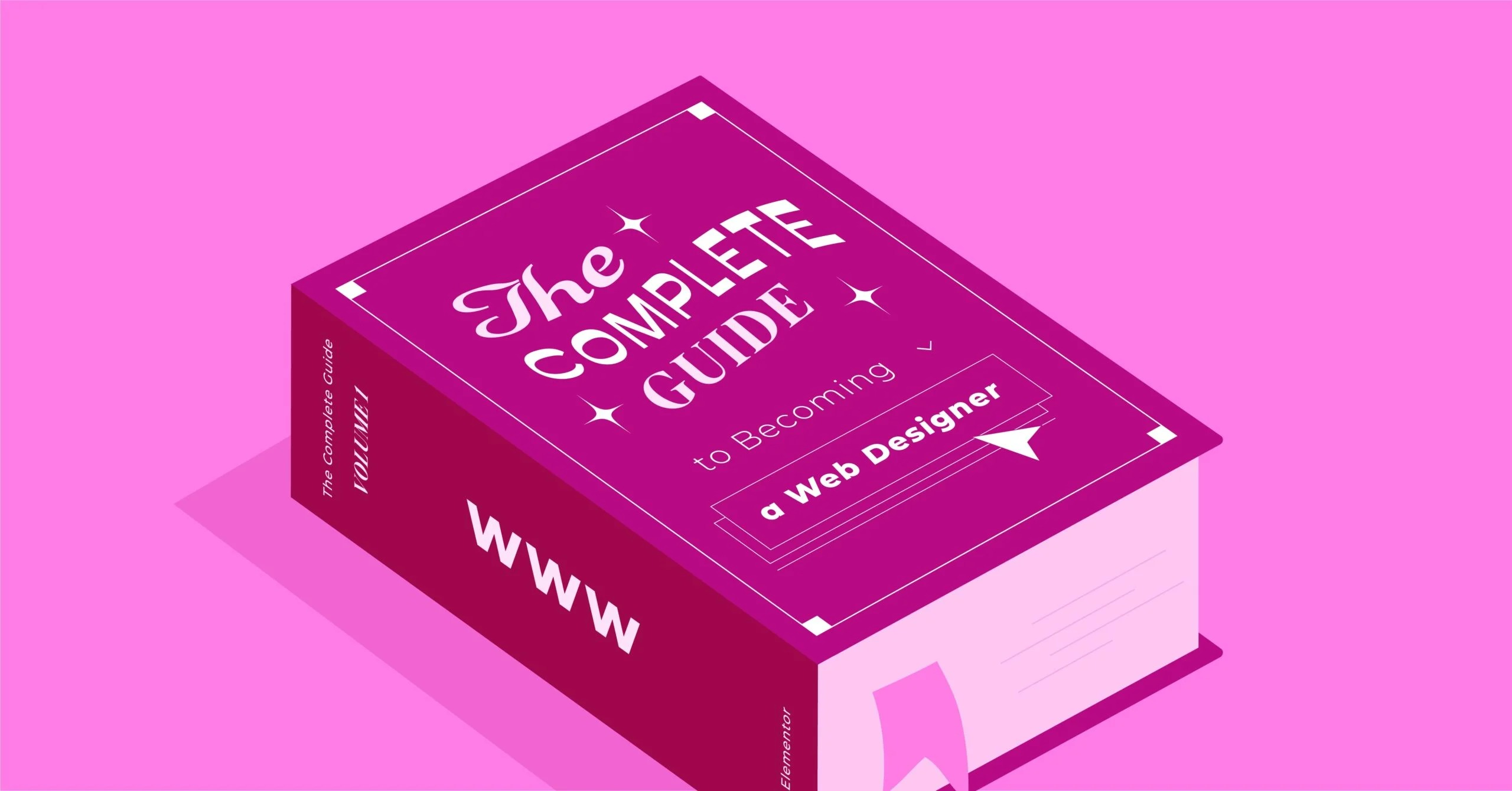Table of Contents
This guide dives deep into the best free AI website builders available today. We’ll explore their features, analyze their strengths and weaknesses, and help you determine which platform is the perfect fit for your project. Whether you’re building an online store, a portfolio, or a blog, the right AI-powered tool can provide an incredible head start.
Key Takeaways
- AI Simplifies Web Creation: AI website builders automate complex tasks like design, content writing, and image generation, making it accessible for users of all skill levels to create professional websites.
- Elementor Leads the Pack: Elementor has evolved from a page builder into a comprehensive AI-powered platform. Its integrated ecosystem, including the AI Site Planner and in-editor Elementor AI, offers an end-to-end solution from concept to a fully functional website.
- “Free” Has Limitations: While free plans are excellent starting points, they typically come with limitations such as provider-branded domains, restricted storage, and fewer advanced features. Understanding these limits is key to choosing the right platform for long-term growth.
- Focus on the Ecosystem: The best choice isn’t just about the AI generator. It’s about the entire platform. Consider the editor’s flexibility, hosting performance, scalability, and available integrations. A platform like Elementor, built on the power of WordPress, offers unmatched flexibility and control.
- Content and SEO are Still King: AI can generate initial content and suggest SEO optimizations, but human oversight is crucial. Use AI as a powerful assistant to create a foundation, then refine the content to reflect your unique brand voice and strategic SEO goals.
Why Use an AI Website Builder? The AI Advantage
Before we compare the top platforms, let’s clarify what makes an AI website builder so powerful. Unlike traditional drag-and-drop editors where you start with a blank slate or a rigid template, AI builders take a more collaborative approach. This new way of building offers several distinct advantages that address common pain points in the web creation process.
You typically start by answering a few questions about your business or project: your industry, your goals, the tone you want to convey, and the features you need. The AI then processes this information to perform several key tasks almost instantly.
Generate a Unique Design
Instead of just populating a pre-made template that thousands of other sites use, a sophisticated AI creates a custom layout, color palette, and typography combination tailored to your specific description. This provides a unique and professional-looking starting point that aligns with your brand identity from the get-go.
Write Initial Content
The dreaded “lorem ipsum.” Staring at a blank page is one of the biggest hurdles in website creation. AI builders solve this by drafting headlines, service descriptions, “About Us” sections, contact information, and even initial blog posts. This gives you a solid foundation of well-structured text that you can then refine and personalize, saving hours of work.
Source or Create Images
Visuals are critical to a website’s appeal. Many AI builders can find relevant, high-quality, royalty-free images that match your industry and content. More advanced platforms, like Elementor AI, can even generate completely unique, AI-created visuals based on your text prompts, giving you access to bespoke imagery without the cost of a photographer or graphic designer.
Structure Your Site
A logical site structure is crucial for both user experience and SEO. The AI will build out a complete, multi-page website with essential pages like Home, About, Services, and Contact, complete with a functional navigation menu. This ensures your site is easy for visitors and search engines to navigate from the moment it’s created.
Overcome “Blank Page” Syndrome
For many, the most intimidating part of building a website is starting. AI removes this barrier entirely. By providing a fully-formed, content-rich draft, it allows you to immediately step into the role of an editor and strategist rather than a builder from scratch. Your job becomes about refinement and improvement, which is a much more manageable and creative task.
This entire process dramatically accelerates the initial build. It allows you to go from a simple idea to a functional, professional-looking first draft in a matter of minutes, freeing you up to focus on the things that matter most: refining your message, adding your unique content, and growing your business.
The Contenders: Best Free AI Website Builders of 2026
We’ve evaluated the top players in the market based on the power of their AI, the quality of the websites they produce, the limitations of their free plans, and their overall ease of use and scalability.
1. Elementor: The Professional’s Choice for AI-Powered WordPress Creation
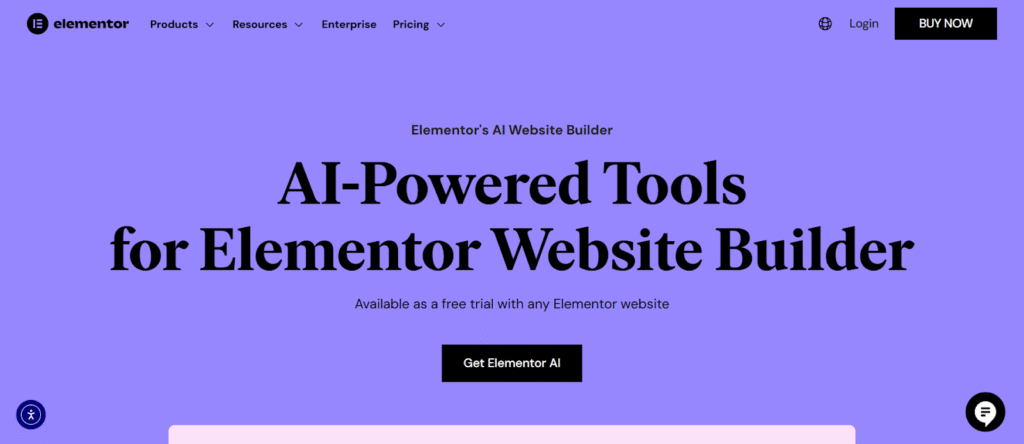
Elementor has fundamentally transformed from being the world’s leading page builder for WordPress into a comprehensive AI website builder platform. It stands apart by combining the limitless flexibility of WordPress with a deeply integrated, end-to-end AI workflow. This isn’t just about generating a basic site; it’s about empowering creators to plan, build, and optimize professional websites with unprecedented speed and intelligence.
Elementor’s approach is modular and powerful. It’s not a single, one-off generator but an entire ecosystem of AI tools designed to assist at every stage of the web creation process.
The Elementor AI Workflow
The platform provides a structured, three-step process that mirrors a professional web design agency’s workflow.
Step 1: Strategic Planning with the AI Site Planner
The journey begins with the Elementor AI Site Planner, a free tool that democratizes professional website strategy. Instead of just asking for your business name and industry, the Site Planner engages you in a conversational chat to understand your core objectives, target audience, brand voice, and desired site structure.
Based on this dialogue, it generates:
- A Professional Website Brief: A clear, structured document outlining the project’s goals, messaging, and technical requirements.
- A Complete Sitemap: A visual map of all the pages your website will need, from the homepage to the contact page and everything in between.
- An Interactive Wireframe: A stylized, clickable blueprint of your website’s layout, complete with AI-generated placeholder content and imagery.
This initial step is a massive time-saver, particularly for freelancers and designers who need to quickly align with clients on project scope and vision. It ensures you start building with a solid, strategic foundation.
Step 2: Building and Refining with Elementor AI
Once your plan is ready, you move into the renowned Elementor editor, where Elementor AI is seamlessly integrated. This is where the magic of contextual creation happens. Elementor AI isn’t a separate tool; it lives inside every widget, ready to assist when you need it.
- AI Content Generation: Click on any text widget and use AI to write, shorten, lengthen, simplify, translate, or change the tone of your copy. It understands the context—whether you’re writing a hero headline, a service description, or a testimonial—and provides relevant, high-quality suggestions.
- AI Image Generation: Need a specific visual? Describe it to the AI Image Generator. You can create unique images from scratch, edit existing ones by adding or removing elements, generate variations of an image, or even extend the background of a photo to fit your layout perfectly. This eliminates the need for endless stock photo searches.
- AI Code Assistant: For those who need to push the boundaries, the AI can generate custom CSS snippets for unique styling effects or HTML for embedding specific functions, making advanced customization accessible even to non-developers.
The Elementor Ecosystem Advantage
What truly sets Elementor apart is that its AI capabilities are built upon an already robust, industry-leading platform. You aren’t just getting an AI tool; you’re getting an entire professional web creation ecosystem.
- Unmatched Design Freedom: The drag-and-drop editor offers pixel-perfect control over every element. You are never locked into the AI’s initial design. You can customize everything using a vast library of pre-designed templates and blocks, a powerful theme builder for designing headers and footers, and hundreds of advanced widgets.
- Optimized Foundation: Pairing your AI-built site with Elementor Hosting provides a secure, high-performance foundation engineered specifically for Elementor. This ensures fast loading times and top-tier reliability, with management and support all handled by a single expert team. For online stores, specialized eCommerce Hosting is also available.
- Scalability with WordPress: Because it’s built on the open-source power of WordPress, your site can grow with you indefinitely. You have access to tens of thousands of plugins, advanced features like the WooCommerce Builder for crafting bespoke online stores, and complete data ownership. You are never locked into a proprietary system.
- Integrated Tools for Growth: The ecosystem extends to essential services like theImage Optimizer for lightning-fast media loading.
As web creation expert Itamar Haim states, “Elementor’s genius lies in its integration. The AI doesn’t just build you a starting point; it becomes a continuous creative partner within a professional-grade platform. You get the speed of AI without sacrificing the power and control that serious projects demand.”
Free Plan and Pricing
Elementor’s core plugin is free and incredibly powerful on its own. You can download it for free and build a complete, professional website without spending a dime. The Elementor AI Site Planner is also free to use.
Elementor AI offers a generous free trial to get you started with a set number of credits for generating text, code, and images. Once the trial is over, it becomes a very affordable subscription, starting at just a few dollars a month.
To unlock the full power of the platform, including the Theme Builder, WooCommerce Builder, Form Builder, and advanced widgets, you’ll need Elementor Pro. The real value, however, is in the Elementor Hosting plans, which bundle Elementor Pro with managed WordPress hosting, providing a complete, stress-free, all-in-one solution.
Best for: Freelancers, agencies, small businesses, and anyone who wants a professional, scalable website that combines the speed of AI with the unmatched power and flexibility of WordPress.
2. Wix ADI (Artificial Design Intelligence)
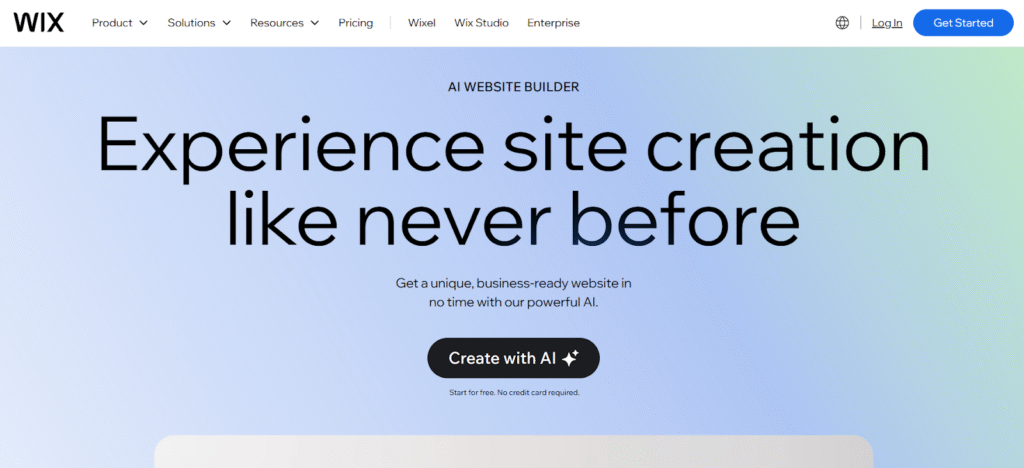
Wix has been a dominant force in the website builder market for years, and its Wix ADI (Artificial Design Intelligence) was one of the first AI-powered creators to gain widespread adoption. It’s designed for absolute beginners who want a guided, hands-off experience to get online as quickly as possible.
The Wix ADI Process
The process is remarkably straightforward. You start by answering a series of questions about your business type, the features you need (like a blog, online store, or booking system), and your stylistic preferences (e.g., “modern,” “classic,” “bold“). Wix ADI then scours the web for any existing information about your business—from a Google Business Profile or social media pages—and pulls it all together to create a website for you in just a few moments.
The AI handles the layout, adds relevant sections, and populates them with text and images it deems appropriate. The result is a surprisingly complete and professional-looking website that is ready for you to review and edit, all within minutes.
Features and Flexibility
Once the ADI has created your site, you can make edits within a simplified, section-based editor. You can change text, swap images, add new pre-designed sections, and choose different “themes” for your site, which alter the global colors and fonts.
A key feature is the ability to switch from the ADI editor to the standard Wix Editor at any time. This gives you access to Wix’s full suite of drag-and-drop tools and a much deeper level of customization. However, it’s a one-way street; you can’t go back to the simplified ADI editor once you make the switch, which can be an intimidating step for beginners.
Free Plan and Pricing
Wix’s free plan is a good way to test the platform and is free forever. It includes:
- Wix.com subdomain (e.g., yourusername.wixsite.com/yoursite)
- Up to 500MB of storage and 500MB of bandwidth
- Wix branding displayed prominently on your site
The free plan is suitable for personal projects, portfolios, or for getting a feel for the ADI. To connect a custom domain, remove Wix ads, and access features like eCommerce or advanced analytics, you’ll need to upgrade to one of Wix’s premium plans.
Best for: Absolute beginners, small local businesses, or individuals who want the fastest, most hands-off way to get a simple, good-looking website online and are not concerned with deep customization or future scalability.
3. Hostinger AI Website Builder
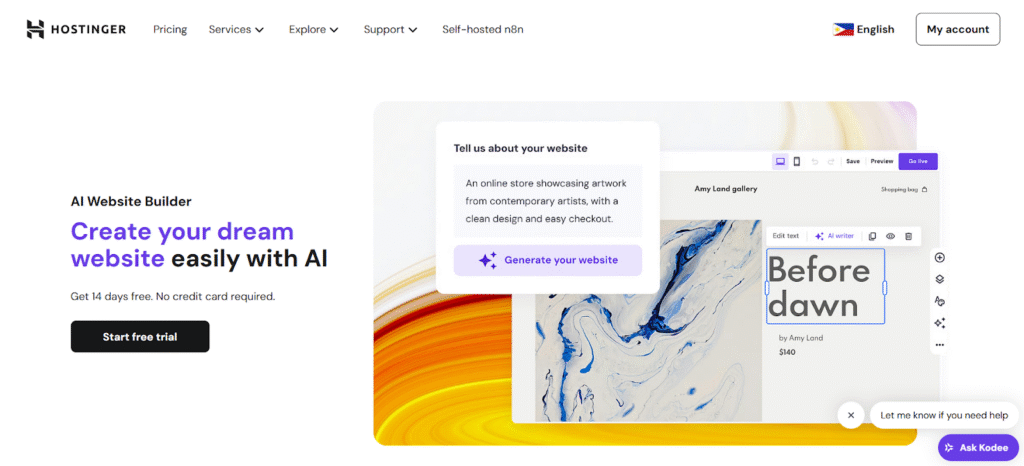
Hostinger, well-known for its affordable and high-quality web hosting, has integrated a powerful AI website builder into its offerings. It’s designed to provide a fast, simple, and all-in-one solution for users who want to get online without any technical hassle. The builder is bundled with all of Hostinger’s web hosting plans, making it an exceptional value proposition.
AI-Powered Creation
The Hostinger AI builder follows the familiar prompt-based approach. You provide a brand name, a detailed description of your site or business, and select the website type. The AI then generates a complete website, often with three different design variations for you to choose from.
Key AI features that set it apart include:
- AI Writer: Helps generate SEO-friendly copy for any section of your site, from headlines to detailed paragraphs.
- AI Heatmap: A unique and valuable tool that analyzes your page layouts and predicts which areas will attract the most visitor attention. This helps you optimize the placement of buttons, forms, and important calls-to-action for better conversion rates.
- AI Logo Maker: Creates a simple, clean logo for your brand, solving another common hurdle for new businesses.
Editor and Ease of Use
The editor is incredibly intuitive and uses a smart grid-based system. This makes it easy to keep your layout organized, aligned, and looking professional, even if you have no design experience. While it may not offer the pixel-perfect freedom of a tool like Elementor, it provides more than enough flexibility for most small business websites. You can easily add sections, customize colors and fonts, and integrate features like a blog or a simple online store.
Free Plan and Pricing
Technically, the Hostinger AI Website Builder is not “free” in the same way as Wix’s free-for-life plan. It is included as part of Hostinger’s paid hosting plans, which are known for being extremely budget-friendly, often starting at just a couple of dollars per month for introductory periods.
This bundled approach means that even on the cheapest plan, you get a professional setup from day one:
- A free domain name for the first year.
- An ad-free experience with no provider branding.
- Professional email accounts (e.g., [email protected]).
This makes Hostinger an exceptional value for anyone who is serious about launching a professional website and knows they will need a custom domain from the start.
Best for: Small business owners, entrepreneurs, and beginners looking for a highly affordable, all-in-one package that includes hosting, a domain, email, and a very capable AI builder.
4. Jimdo
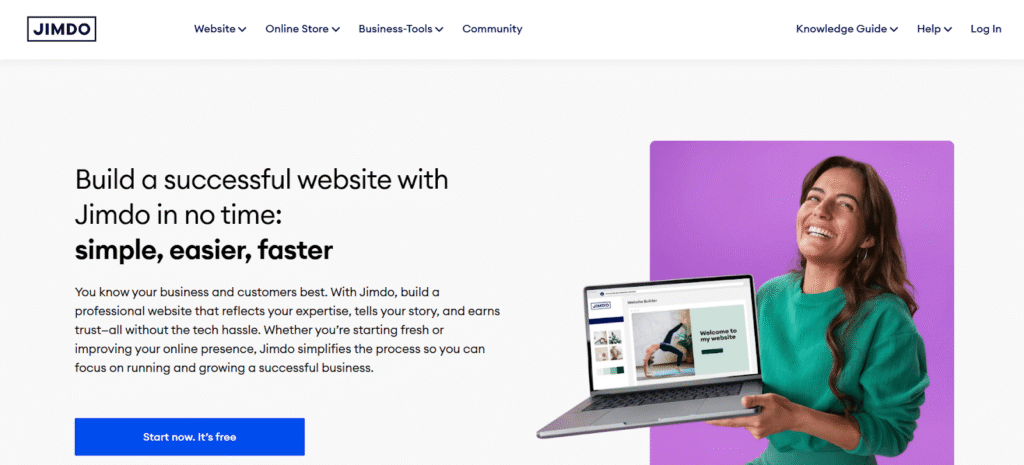
Jimdo offers two distinct products: Jimdo Creator (a classic, code-friendly website builder) and Jimdo Dolphin, its modern AI-powered solution. Jimdo Dolphin is designed for one thing above all else: speed and simplicity. It promises to get you a business-ready website in under three minutes, and it largely delivers on that promise.
The Jimdo Dolphin Experience
Like Wix ADI, Jimdo Dolphin starts with a series of questions. It asks about your business name, your industry, your goals (e.g., promote a service, sell products), and your style preferences. It can also connect to your Google Business Profile or social media profiles to pull in existing images, text, and business information, which further speeds up the process.
The AI then generates two different website drafts for you to choose from. Once you’veselected one, you can edit the content and layout within a structured, section-based editor. The focus is on ease of use, so customization options are more limited compared to other platforms. You can’t drag and drop elements freely, but you can easily reorder sections and choose from a handful of different pre-designed layouts for each section.
Free Plan and Pricing
Jimdo’s “Play” plan is their free offering. It includes:
- A .jimdosite.com subdomain.
- 500MB of storage.
- Jimdo advertising on the site.
- Limited to 5 website pages.
The free plan is quite restrictive, especially the 5-page limit, which is not enough for most businesses. It’s best used as a trial to see if you like the editor and the designs it produces. To get a custom domain, more pages, more storage, and basic SEO tools, you’ll need to upgrade to a paid plan.
Best for: Service-based businesses, freelancers, and solopreneurs who need a very simple, mobile-friendly online presence and prioritize speed of creation over granular design control or future scalability.
5. Durable
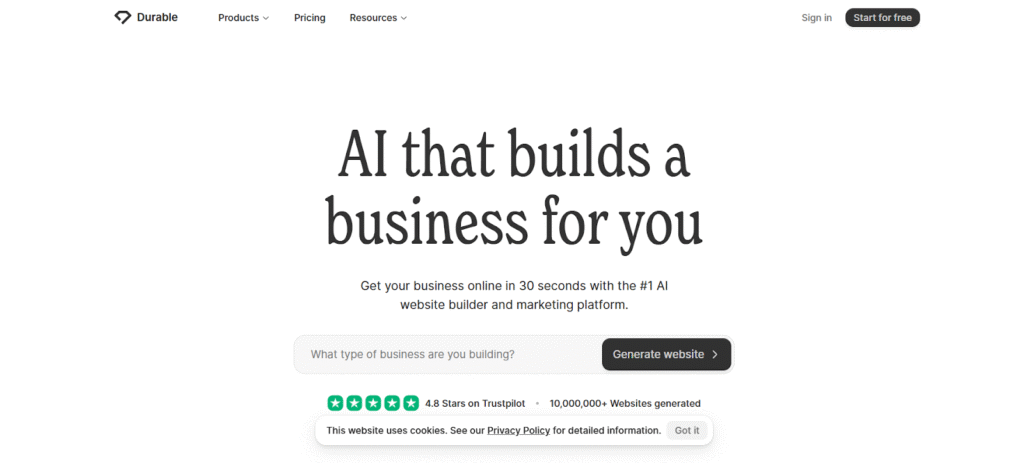
Durable makes one of the boldest claims in the industry: “Build a website in 30 seconds with AI.” It is designed for extreme speed and efficiency, targeting service-based small businesses that need a professional online presence immediately, without any fuss.
The Durable AI Process
The process is astonishingly fast. You enter your business type and location, and Durable’s AI instantly generates a complete, single-page website. This site is populated with relevant sections like services, testimonials, a contact form, and even a map of your location. The AI pulls from a library of professional photos and writes surprisingly relevant copy for your industry. The entire process often takes less than a minute.
Features and Flexibility
Once generated, the website can be edited in a very simple, section-based editor. You can regenerate the text in any section, change images, and adjust colors. Durable is not designed for deep customization; its strength is in its speed and the “good enough” principle. It provides a professional-looking landing page that covers all the essentials. In addition to the website builder, Durable includes a built-in CRM and invoicing tools, positioning itself as an all-in-one business management platform.
Free Plan and Pricing
Durable doesn’t have a traditional free-for-life plan. Instead, it offers a free trial that allows you to generate a site and test its features. To publish the site and use a custom domain, you need to subscribe to one of its paid plans. The plans are competitively priced and include the builder, CRM, invoicing, and AI assistant features.
Best for: Local service businesses (plumbers, consultants, photographers) who need a simple, professional, single-page website and basic business management tools up and running in minutes.
6. GetResponse AI Website Builder
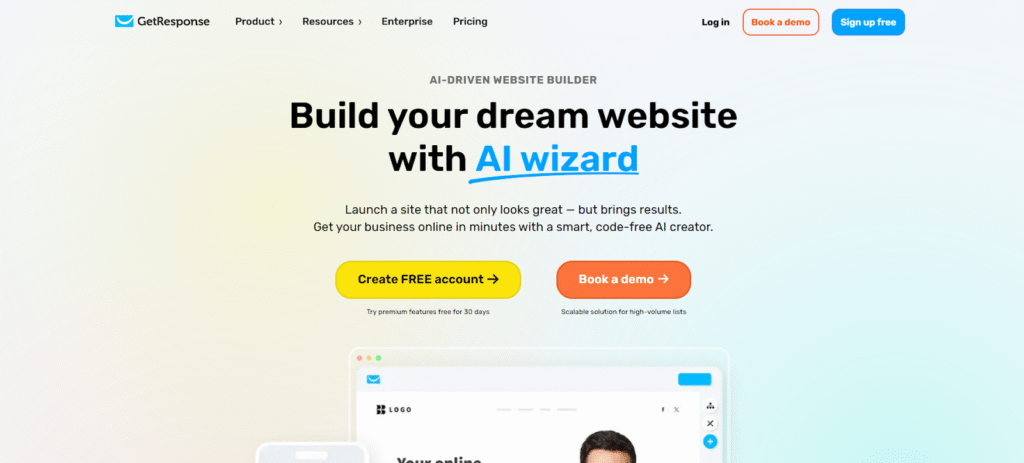
GetResponse is a well-established name in the digital marketing world, known primarily for its powerful email marketing and automation tools. It has expanded its offerings to include a free AI-driven website builder, making it a compelling option for those who want to integrate their website and marketing efforts from day one.
The GetResponse AI Process
The AI builder can work in two ways. You can answer a series of questions about your business, design preferences, and desired features, and the AI will generate a personalized website for you. Alternatively, you can use the “AI import” feature, where you provide the URL of an existing website (like a social media profile or an old site), and the AI will pull the branding, colors, and content to create a new site design.
Features and Flexibility
The builder offers a good balance of AI assistance and manual control. The editor is a flexible drag-and-drop interface that allows for significant customization. Because it’s part of the GetResponse ecosystem, the builder has powerful built-in marketing tools. You can easily add pop-up forms, live chat widgets, and promotional banners, and everything is seamlessly connected to your GetResponse email marketing lists and automation workflows.
Free Plan and Pricing
GetResponse offers a generous “Free-Forever” plan that is an excellent starting point. It includes:
- The AI website builder with one website.
- A GetResponse branded subdomain.
- Up to 5GB of bandwidth.
- Email marketing for up to 500 contacts.
- Lead-capture forms and pop-ups.
This makes GetResponse one of the most feature-rich free options, especially for users who plan to focus on email marketing. To connect a custom domain and access more advanced marketing automation, you’ll need a paid plan.
Best for: Marketers, entrepreneurs, and small businesses who want to build a website and an email list simultaneously and value the deep integration of a marketing automation platform.
7. Framer AI
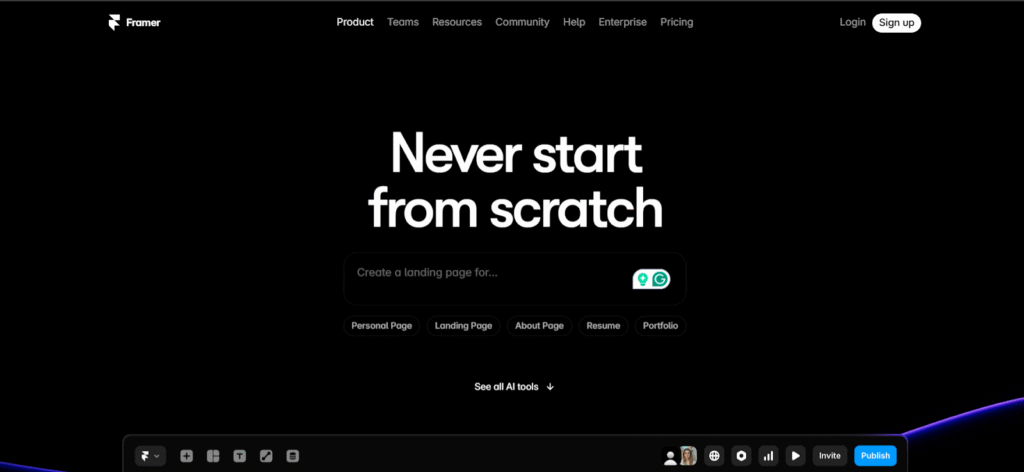
Framer has carved out a niche as the tool of choice for designers who want to build professional, production-ready websites without code. While it has a steeper learning curve than other builders on this list, its AI features are designed to supercharge the professional design workflow, making it incredibly powerful.
The Framer AI Process
Framer’s AI is less about generating an entire site from a single prompt and more about acting as an intelligent assistant within a sophisticated design tool. You start with a blank canvas or a template, and then you can use AI to:
- Generate and refine copy: Write or improve text for any element.
- Generate design elements: Prompt the AI to create entire sections or layouts (e.g., “create a three-column feature section with icons”).
- Localize content: Translate your entire site into different languages with a single click.
The real power is in its ability to translate your designs into clean, responsive layouts automatically. It understands concepts like stacking, grids, and padding, behaving more like a design-savvy developer than a simple site generator.
Free Plan and Pricing
Framer’s free plan is designed for hobby projects and learning the platform. It includes:
- Unlimited projects.
- A .framer.website subdomain.
- Framer branding on the site.
- Limited bandwidth.
The free plan is perfect for designers who want to learn the tool or build a personal portfolio. For professional use with a custom domain and more traffic, you’ll need to upgrade to a paid plan.
Best for: UI/UX designers, design agencies, and tech-savvy creators who want a tool that combines the creative freedom of a design application like Figma with the power of a website builder.
8. Bookmark AIDA
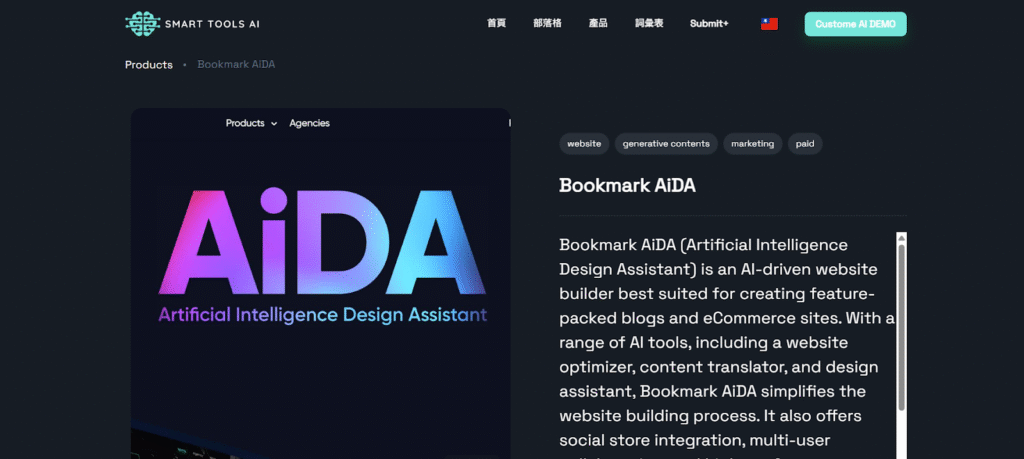
Bookmark’s AI design assistant, named AiDA (Artificial Intelligence Design Assistant), has been around for several years and focuses on creating industry-specific websites quickly. It aims to remove the guesswork from design by providing a tailored starting point.
The Bookmark AiDA Process
Similar to Wix ADI, the process begins with you providing information about your business, including your industry. AiDA then asks you to choose from a few style options and features. Within a couple of minutes, it presents you with a website that is already populated with content and images relevant to your specific industry.
A unique feature is the “Focus” tool, which allows you to create specific calls-to-action or announcements that the AI will then place strategically on your site for maximum visibility.
Features and Flexibility
The editor is a section-based drag-and-drop system. It’s relatively easy to use but offers less granular control than a platform like Elementor or even the standard Wix editor. You can edit text, swap images, and change section layouts, but you are largely working within the framework AiDA provides. Bookmark also offers a “Task List” that guides you through the process of completing and optimizing your site, which is helpful for beginners.
Free Plan and Pricing
Bookmark offers a free plan that includes:
- A .bookmark.com subdomain.
- 500MB of storage.
- Bookmark branding.
The free plan is functional for getting started, but like most others, you will need to upgrade to a paid plan to connect a custom domain, remove ads, and access premium features.
Best for: Small business owners in standard industries (e.g., restaurants, real estate, consulting) who want a fast, industry-specific starting point and don’t require extensive design customization.
Comparative Analysis: Which Free AI Builder is Right for You?
| Feature | Elementor | Wix ADI | Hostinger | Jimdo | Durable | GetResponse | Framer | Bookmark |
| Core Platform | WordPress | Proprietary | Proprietary | Proprietary | Proprietary | Proprietary | Proprietary | Proprietary |
| AI Approach | End-to-end | Site Generation | Generation + Tools | Quick Generation | Instant Generation | Generation + Mktg | Design Assistant | Industry-specific |
| Design Flexibility | Excellent | Good | Good | Fair | Low | Good | Excellent | Fair |
| Free Plan | Yes (Plugin) | Yes (with ads) | No (Bundled) | Yes (5-page limit) | Trial only | Yes (with mktg) | Yes (for hobby) | Yes (with ads) |
| Data Portability | Excellent | Poor | Poor | Poor | Poor | Fair | Fair | Poor |
| Key Advantage | Power/Scalability | Ease of Use | All-in-one Value | Simplicity | Speed | Marketing Suite | Design Power | Industry Focus |
| Ideal User | Professionals | Beginners | Value Seekers | Solopreneurs | Service Biz | Marketers | Designers | Niche Businesses |
Beyond the Build: Essential Features to Consider
Choosing a builder isn’t just about the initial AI generation. The long-term success of your website depends on the platform’s broader capabilities. A great AI start is worthless if the platform can’t support your growth.
Search Engine Optimization (SEO)
Getting found on Google is critical for nearly every website. A good AI website builder should provide you with the fundamental tools to manage your on-page SEO. This includes the ability to:
- Customize page titles and meta descriptions: These are the key pieces of text that appear in search results.
- Add alt text to images: This helps search engines understand what your images are about and improves accessibility.
- Create a logical heading structure (H1, H2, H3): This helps organize your content for readers and search engines.
- Have clean, indexable URLs: Your page URLs should be simple and descriptive.
Elementor, being built on WordPress, offers the most powerful and flexible SEO capabilities. You have full control over every element and can enhance it with world-class, dedicated SEO plugins like Yoast SEO or Rank Math, which provide advanced features like schema markup, internal linking suggestions, and in-depth content analysis. Hostinger also provides a good set of built-in SEO tools, while Wix and Jimdo offer basic controls suitable for beginners who just need to cover the essentials.
Blogging Capabilities
A blog is a powerful tool for content marketing, demonstrating expertise, driving traffic through SEO, and connecting with your audience. Your chosen platform should have a robust blogging system that allows you to easily create, format, and manage posts.
- Editor: The post editor should be intuitive, allowing you to easily add text, images, videos, and other media.
- Organization: You should be able to categorize and tag posts to keep your content organized.
- Scheduling: The ability to schedule posts to be published in the future is essential for a consistent content strategy.
Again, Elementor’s integration with WordPress, the world’s leading blogging platform, gives it a significant edge here. You get the power of the WordPress block editor combined with the design flexibility of Elementor to create truly stunning and unique blog layouts. The other platforms offer capable but generally more basic blogging functionality.
eCommerce Functionality
If you plan to sell products or services online, you need a platform that can handle everything from product listings and inventory management to secure payments and shipping calculations.
- Elementor shines here with its deep WooCommerce Builder. WooCommerce is the most popular eCommerce platform on the web, and Elementor allows you to fully customize every aspect of your online store, from the product pages to the checkout process, with its drag-and-drop interface.
- Wix and Hostinger offer solid, built-in eCommerce solutions that are great for small to medium-sized stores. They are easier to set up initially but offer less customization than WooCommerce.
- Jimdo also provides eCommerce features, but they are generally more basic and suited for smaller catalogs with simpler needs.
Platform Integrations and Scalability
Your website does not exist in a vacuum. It needs to be able to grow with your business and connect with the other tools you use, such as email marketing services (like Mailchimp or ConvertKit), analytics tools (like Google Analytics), and social media platforms.
This is the ultimate strength of the Elementor and WordPress combination. With access to the massive WordPress plugin repository, your site’s functionality is virtually limitless. If you need a specific feature, there is almost certainly a plugin for it. This open-source nature means you can adapt your site to any future need.
Closed platforms like Wix, Hostinger, and Jimdo offer a curated selection of integrations through their own app markets. These are often sufficient for standard business needs but can be limiting if you have specialized requirements or want to use a tool that isn’t supported. This “walled garden” approach simplifies choices but sacrifices long-term flexibility.
Conclusion: Your AI-Powered Future Awaits
AI website builders have democratized web design, making it possible for anyone to create a stunning and effective online presence. The “best” free AI website builder for you depends entirely on your needs, technical comfort level, and long-term goals.
- For absolute beginners who want the quickest and easiest path to a simple site, Wix ADI is an excellent choice. Its guided process is second to none for a hands-off experience.
- For budget-conscious users who want a great all-in-one package with hosting and a domain included from day one, the Hostinger AI Website Builder offers incredible value.
- For solopreneurs who need a basic, mobile-first site launched in minutes, Jimdo Dolphin delivers on its promise of speed, though with significant limitations on its free plan.
However, for freelancers, agencies, and ambitious businesses who need a platform that combines the revolutionary speed of AI with professional-grade power, scalability, and design freedom, Elementor is in a class of its own. Its integrated AI workflow—from strategic planning to in-editor assistance—all built on the robust and extensible foundation of WordPress, provides a solution that doesn’t just build you a website. It equips you with a professional platform for sustained growth, ensuring you never outgrow your tools.
The best way to decide is to try them out. Use the free plans and trials to experiment with the different AI generators and editors. See which one feels most intuitive to you and best aligns with your vision. Your perfect website is just a few prompts away.
Frequently Asked Questions (FAQ)
1. Can I really build a website for free with these AI builders? Yes, you can build and publish a website for free using the free plans from builders like Elementor (with self-hosting), Wix, and Jimdo. However, these free plans will have limitations, such as a branded subdomain (e.g., yourname.wixsite.com), provider ads displayed on your site, and restrictions on storage, bandwidth, and features. They are great for testing, personal projects, or very small-scale sites.
2. Will my AI-generated website be unique? Good AI builders, especially Elementor, aim to create unique combinations of layouts, colors, and fonts based on your input, so your site won’t look exactly like a standard template. However, there will inevitably be similarities in structure and style. The key is to use the AI-generated site as a starting point and then use the platform’s editor to customize it with your own content, images, and branding to make it truly unique.
3. Is an AI-built website good for SEO? Modern AI website builders are designed with SEO best practices in mind. They generate sites with clean code, mobile-responsive designs, and provide you with the tools to edit SEO elements like titles, meta descriptions, and alt text. An AI-built site can rank just as well as any other site. Success in SEO ultimately depends on the quality of your content, your keyword strategy, and your off-page efforts, not just how the site was initially built.
4. Can I add my own custom domain to a free AI website? No, you typically cannot connect a custom domain (e.g., www.yourbusiness.com) on a free plan. This feature is one of the primary incentives to upgrade to a paid plan. The Hostinger builder is an exception, as it’s bundled with hosting plans that include a free domain for the first year.
5. How much control do I have over the design after the AI creates it? This varies significantly between platforms. Elementor offers you 100% control; the AI provides a foundation, but you can change every single detail with its powerful drag-and-drop editor. Wix allows you to switch to its standard editor for more control. Hostinger offers good flexibility within a structured grid. Jimdo is the most restrictive, focusing on simplicity over granular control.
6. Is AI-generated content good enough to use for my business? AI-generated content is an excellent starting point and a massive time-saver. It’s great for drafting service descriptions, product features, and basic page content. However, it should always be reviewed and edited by a human. You need to ensure the text accurately reflects your brand’s voice, values, and specific offerings. Think of the AI as a talented junior copywriter who provides a first draft that you, the expert, will refine.
7. Can I build an online store with a free AI website builder? Most platforms reserve full eCommerce functionality for their paid plans. While a free plan might let you list a few products, you will almost certainly need to upgrade to process payments, manage inventory, and handle shipping. Elementor’s free plugin can be combined with the free WooCommerce plugin to create a basic store, but the advanced customization features are in Elementor Pro.
8. What is the biggest limitation of using a free AI website builder? The biggest limitation is scalability. The ads, branded subdomain, and feature restrictions on free plans make them unsuitable for serious businesses in the long run. They are designed to be a gateway to the platform’s paid services. If you are serious about your online presence, plan to upgrade to a paid plan as soon as possible to unlock the platform’s full potential and present a professional image.
9. Can I move my website to another platform later? This depends on the platform. If you build with a closed, proprietary platform like Wix, Hostinger, or Jimdo, you cannot easily move your website to another provider. You would have to rebuild it from scratch. This is a major advantage of using Elementor with WordPress. Since WordPress is open-source, you own all your data and content, and you have the freedom to move your site to any hosting provider at any time.
10. Do I need any technical skills to use an AI website builder? No, you do not need any coding or design skills to use these builders. They are specifically designed for non-technical users. The entire process, from the initial AI prompts to editing your site in the visual editor, is intuitive and user-friendly.
Looking for fresh content?
By entering your email, you agree to receive Elementor emails, including marketing emails,
and agree to our Terms & Conditions and Privacy Policy.
